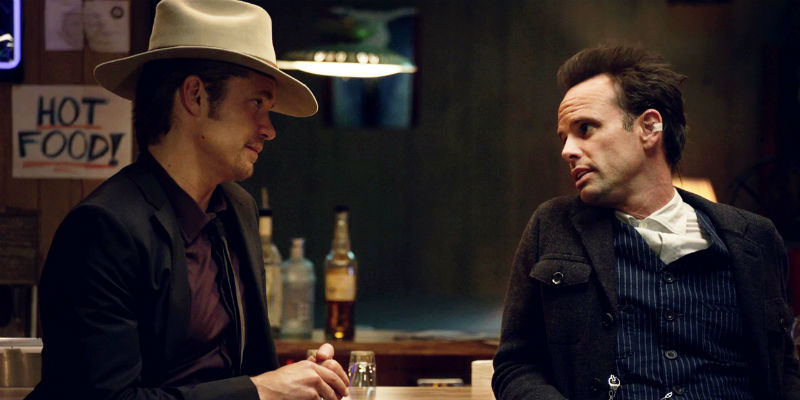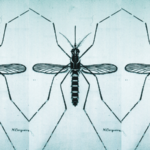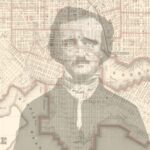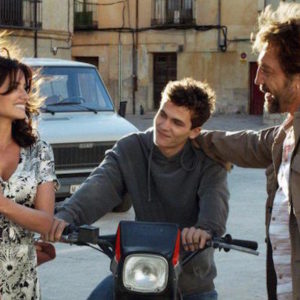Let’s say the current golden era of high-quality television shows started 20 years ago with The Sopranos. When we watch these shows, we are usually watching crime shows. Nearly every prestige show has a crime element to it, from the obvious like Breaking Bad to the subtler shows like Mad Men, which is really just the story of a long con.
Justified fits into this theory very neatly: it is a convoluted and absorbing story of cops and robbers, or more specifically, of US Deputy Marshal Raylan Givens (played with an aw-shucks charm by the preternaturally handsome Timothy Olyphant) returning to work in the eastern district of Kentucky, which includes his hometown in Harlan County. The show successfully traffics in Western tropes: time and again the outlaws go up against the lawman, a morally ambiguous character who enjoys his work a little too much. Justified is deeply rooted in Harlan, the coal-driven and decimated section of Kentucky, which is itself a symbol of a disappearing way of life: the hardscrabble work of coal mining. Much is made of the fact that Raylan dug coal before joining the marshal service, as going down in the mine is a rite of passage in Harlan. We are also often reminded that Raylan and the men he’s trying to catch, chief among them Boyd Crowder (a sensational Walton Goggins), dug coal together. Going down into the mines together in Justified is like massaging blubber side-by-side on the Pequod in Moby-Dick: it’s more than just work, it’s a way of life.
Justified explores the decline of mining and the rise of criminal activities in its place. Harlan has long had a reputation for lawlessness, and though Raylan is less than thrilled to return to his roots, he takes cleaning up Harlan very seriously. Justified is based on a short story by Elmore Leonard, and it retains some of the best aspects of Leonard’s crime writing: vivid storytelling, likable and sympathetic characters, and, most distinctively, a dry and pronounced sense of humor that permeates even the show’s considerable violence. It’s a show in which a criminal talks endlessly about “the twenty foot rule,” wherein it’s easier to kill a man with a knife than a gun within that distance, only to find that character running with his knife toward Raylan, tripping, and stabbing himself.
Justified opens with Raylan working in Miami, meeting a man he has given 24 hours to get out of town. If he doesn’t, Raylan will go old school and shoot on sight. This is indeed what happens, at a swanky Miami hotel bar, and it reveals volumes about Raylan’s character. He’s a gunslinger, a servant of justice who takes his mission very seriously but still retains a sense of irony about what’s within and what’s outside the law. When the Miami shooting leads to his transfer to Kentucky, Raylan is less than thrilled: he’s worked hard to leave Harlan behind, and now it is going to be his world again. His father, Arlo, an old scam artist and petty criminal, still lives in the house where Raylan grew up; Arlo has since married Raylan’s Aunt Helen (his dead mother’s sister) and is still involved in various criminal enterprises. Raylan’s ex-wife, Winona, is also back in Kentucky, married to a buffoonish real estate agent and working as a court reporter (thus setting up many run-ins in the Lexington courthouse between Raylan and Winona, who still have considerable chemistry). His new boss in the Kentucky field office is Art Mullen, a blunt and seasoned marshal who knows Raylan from teaching shooting together at the marshal training academy. The Miami incident, too, precedes Raylan everywhere: apparently the criminal underground takes notice when a marshal in a white hat (yes, our hero literally wears a white Stetson) makes good on a promise to shoot a criminal in a swanky Miami poolside bar. “He pulled first. I shot him,” Raylan says about the incident, as if it were a perfectly normal thing to do. Raylan is smart but rather bullheaded about the law, which is his prerogative as a marshal. He is also a very quick and accurate shot, and his hand is never far from his holster.
 Timothy Olyphant and Walton Goggins in Justified
Timothy Olyphant and Walton Goggins in Justified
In the first episode Raylan’s nemesis is introduced and established: his name is Boyd Crowder, and he and Raylan dug coal together when they were 19. Crowder is an explosives expert—the Leonard story Justified is based on is called “Fire in the Hole,” which is what the powder men yell in the mines before they set off a charge. Boyd is also presently a white supremacist, complete with Swastika tattoo and rhetoric about the mud people descended from Cain. And he still loves blowing things up: in this episode he firebombs a black church, but he has a considerable reputation for blowing up bank vaults. When Art asks Raylan about his previous relationship with Boyd Raylan says, “We weren’t what you would call buddies but when you work a deep mine with a man you look out for each other.” Boyd has been through a stint in Kuwait and one in prison. Raylan has been through marshal training and lived the life of a lawman. Yet the men are joined by their formative experience growing up in Harlan and going into the mines. There’s another crucial connection between the men: their fathers were petty criminals together. Arlo Givens and Bo Crowder ran drugs, guns, and money through Harlan, and it’s not hard to imagine an alternate future where their sons were in business rather than at odds.
There is a woman, too, who connects Raylan and Boyd: Ava Crowder, who, when the series begins, has just shot her abusive husband Bowman Crowder, Boyd’s brother, with a shotgun while he ate his favorite dinner. When Raylan comes to see Ava their old romance returns: she confesses to having a crush on him in high school and wishes he had taken her with her when he left Harlan. Between Winona and Ava Raylan’s romantic life is confined to a series of women from the past, and the past is a real burden in Harlan. Ava’s now entrenched with the Crowder’s: it’s not long before Boyd pays her a visit, though it’s not to avenge his brother. It’s to make time with his widow. Ava says to Raylan, “Boyd doesn’t want to shoot me. He wants to go to bed with me.” The women of Justified are generally a step ahead of the men. After an entanglement with Ava—not a good idea, as she is a defendant in the active case of her husband’s death—Raylan ends up picking up with his ex-wife Winona, who has his number: “Raylan, you do a good job of hiding it but you are the angriest man I know,” Winona says. Justified has a cast full of angry men, Boyd and Raylan chief among them. Boyd tells Raylan, “You think you know me? Well I know you Deputy Marshal Raylan Givens. I know you like to shoot bad people.” This is true; but it’s also true that Raylan doesn’t mind shooting a medium person here and there in order to make a point.
Through six seasons with different villains Justified remains insightful about this deep anger. It’s the new coal of Harlan County, the engine which makes the region run. It’s MAGA hats and the so-called disenfranchised poor white man who turns to Trump and/or oxy to get through life. Justified is also smart about the sprawl and variety of criminal activity in the region: pot growing and distribution, traffic in opioids, potential race riots, and outsiders, including both criminals and corporations, coming in to try and exploit the people of Harlan. It’s notable that the big bad in most seasons is a family: the aforementioned Crowders in season one; Mags Bennett (the incomparable Margo Martindale) and her deadbeat sons in season two; Ellstin Limehouse and the African-Americans of Noble Holler in season three; the Dixie Mafia run by the splintering Detroit mob in season four; the dim bulbs of the self-declared rednecks of the Crowe family in season five; and a greatest hits of old villains including Boyd in the final season. Family in Justified is both solace and a pain in the ass; it’s primarily people who will drag you down sooner then they will lift you up. Though the heart of the show remains the conflict between Boyd and Raylan and the slipperiness of who is an outlaw and who is a lawman, these larger criminal enterprises both enhance the rootedness of Justified and open it up to a larger world.
Things that thrive in Harlan include weed, coal, grudges, families, old-time religion, and outlaws. The land is treated with primacy. It’s equivalent to the families that live on it…The world Justified presents in Harlan and in Lexington, Kentucky is one of comic violence, stratified social class, moral ambiguity, and finely drawn supporting characters. The show traffics in a particular strain of near toxic masculinity specific to Kentucky, featuring coal, bourbon, hollers (the local name for the long-settled dips between the mountains), moonshine, gun culture, and both smart and incredibly stupid criminals. Things that thrive in Harlan include weed, coal, grudges, families, old-time religion, and outlaws. The land is treated with primacy. It’s equivalent to the families that live on it, and in seasons two and six outsiders come in and attempt to buy up that land. They’re met with unwilling customers. Harlan might be lousy but it’s home.
In six seasons Justified never bores or loses its footing. It feels loose but there are no tangents. The dialogue is sharp and often funny. Justified is wisely scored: the theme song by Gangstagrass is an unusual mashup of bluegrass and hip-hop, and there could be an argument for the show as glorifying a new breed of gangster hillbilly (a word the characters throw at each other). Boyd and Raylan may not rap but they are subject to the hyperbole of hip-hop battles where rappers try to best each other with words. No matter what else is going on the show always astutely returns to the conflict between Boyd and Raylan, the cop and the robber, the angry marshal and the wily criminal. Exasperated by the chase, in the second-to-last episode of the show Boyd says to a man he reluctantly carjacked, “I don’t give a shit about the ballad of Boyd Crowder.” But he does, and so does Raylan. Without the ballad of Boyd Crowder, Raylan Givens would not have purpose in life. Justified celebrates both the lawman and the outlaw, the moll of a thuggish mobster and the crooked small-town cop, the guileless whore and the burnt-out miner, the ambitious mobster and the reluctant madam—the whole damned tapestry of Harlan County, Kentucky.

















